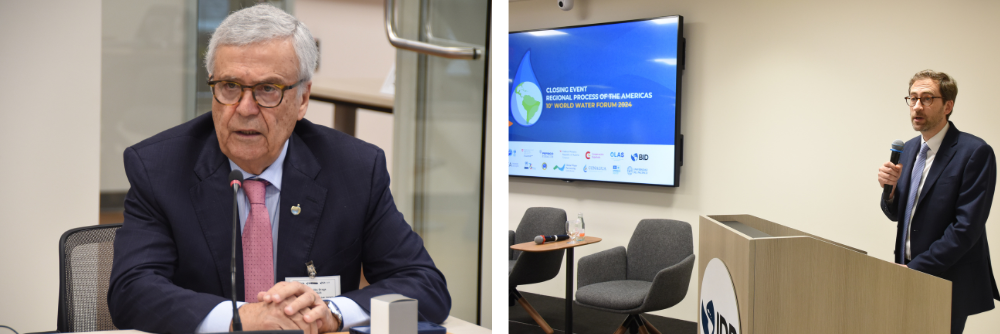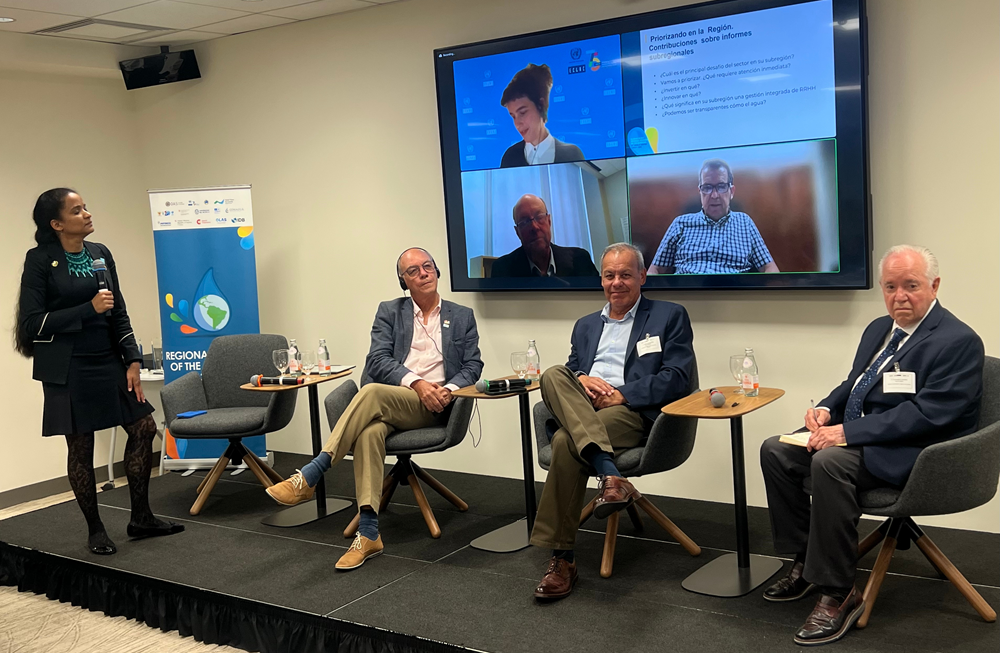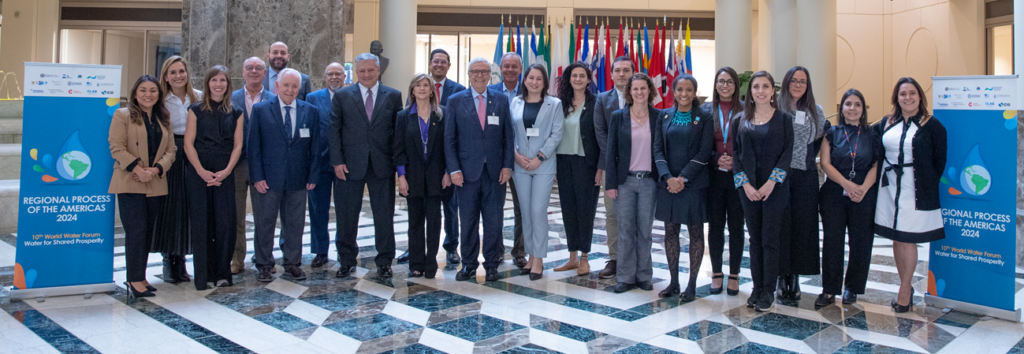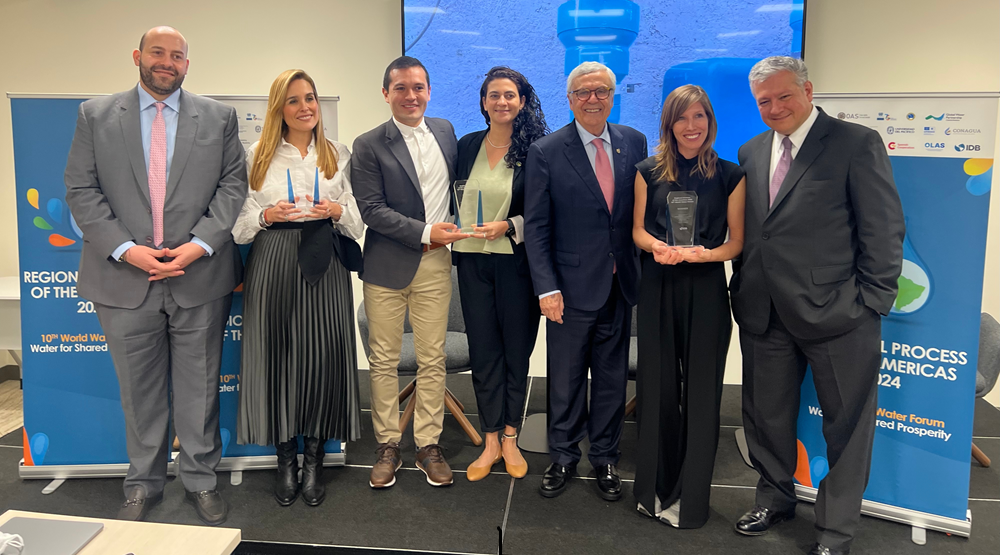On Friday, April 19, 2024, the Water and Sanitation Division of the Inter-American Development Bank (IDB) hosted the closing event of the Americas Regional Process of the 10th World Water Forum (WWF) in Washington, DC. This hybrid event brought together prominent leaders, experts, and professionals from the sector to reflect on the progress, challenges, and opportunities in water management in Latin America and the Caribbean.
The ceremony was inaugurated by Tomás Serebrisky, Manager of the Infrastructure and Energy Sector at the IDB, and Benedito Braga, Honorary President of the World Water Council, co-chair organizer of this process.
Serebrisky emphasized the importance of the Americas Regional Process. He acknowledged the collaborative effort of more than 24 organizations in the water and sanitation sector in Latin America and the Caribbean. Additionally, he emphasized the need to continue working together to ensure access to water and sanitation services through sustainable, resilient, and inclusive infrastructure.

Key Points for Water Security
The closing event of the Americas Regional Process reflected the region’s commitment and determination to address water challenges with innovation, collaboration, and long-term vision. The speakers emphasized the need to:
- Invest in sustainable and multipurpose water infrastructure and promote ecosystem conservation and restoration as natural infrastructure to close existing gaps in coverage, prioritizing the needs of women, indigenous peoples, Afro-descendants, and other vulnerable groups.
- Strengthen institutional and regulatory frameworks and coordination mechanisms at all levels.
- Generate monitoring systems to support decision-making; assess the effectiveness of water management instruments and improve transparency.
- Promote dialogue and coordination mechanisms; strengthen capacities through existing regional platforms and instruments, particularly in transboundary basins.
- Foster an intersectoral and multilevel perspective to diversify financing and promote greater flexibility in its management.
- Conduct applied research and capacity building to develop and establish circular economy systems for more efficient use of water resources.
- Invest in the development of institutional human capital and promote career plans to integrate youth and generational turnover.
Overview of the Americas Regional Process
Sergio Campos, Head of the Water and Sanitation Division of the IDB, highlighted the importance of collective action in seeking solutions to water challenges in the region. Since July 2023, three major lines of action have taken place:
- Dialogue with Governments. Approximately 48 focal points within the governments of Latin America and the Caribbean committed to providing official sectoral data for the drafting and development of sub-regional reports carried out by the coordinators and academic allies of the process.
More than 12 organizations were involved, including the OAS, OLAS, UNESCO, the Caribbean Development Bank (CDB), GWP Central America, CONAGUA, UNAM, the University of the Pacific of Peru, among others.
- Regional Workshops. Six regional workshops were organized online, in Brazil, Guyana, Argentina, and Panama on themes related to the World Water Forum to encourage civil society, youth groups, and various entities to provide their perspective on key sectoral issues in the Americas.
- Call for Proposals. 486 proposals were received in an open call for all types of actors in the water and sanitation sector. Among these cases, 269 experiences passed the first stage of evaluation. The top three case studies and best practices will be compiled in a regional report to be presented at the 10th World Water Forum 2024.
An evaluation committee of 24 experts were able to score and select the winners, thanks to their experience and reputation in the sector.
Water in Different Subregions
Part of the event was dedicated to presenting the most important results in the sub-regional reports of Central America and Mexico, South America, the Caribbean, and North America.
The Central America and Mexico subregion was led by Fabiola Tábora from the Global Water Partnership (GWP) and Silvia Chávez from the National Water Commission (CONAGUA).

The Caribbean subregion was presented by Dwayne Squires, a specialist from the Economic Infrastructure Division of the Caribbean Development Bank (CDB), and Adrian Cashman, Consultant from AKWATIX: Water Resources Management.
Miguel Doria, Regional Hydrologist of UNESCO for Latin America and the Caribbean, was in charge of the South America Subregion.
Christopher Neale from the University of Nebraska, along with Dale Jacobson from the American Society of Civil Engineers, presented on the North America subregion.
Prioritizing in the Region

One of the highlights of the event was the panel on prioritization, moderated by Anamaría Núñez, Senior Communications Specialist of the Water and Sanitation Division of the IDB. Experts from academia to consultancy and public management offered valuable insights on how to address water challenges comprehensively and sustainably. They prioritized innovation, green infrastructure, nature-based solutions, raising awareness and educating society to be more hydro-intelligent, capacity building, and supporting emerging populations such as women and youth.
Panelists included:
- José Luis Bonifaz, Director of the Master’s Degree in Public Services Regulation and Infrastructure Management at the University of the Pacific (Peru).
- Adrian Cashman, Consultant, AKWATIX: Water Resources Management.
- Fernando J. González Villarreal, Senior Researcher at the UNAM Engineering Institute.
- Manuel Basterrechea, Private Consultant and General Manager of Basterrechea Associates Advisory.
- Alba Llavona, Consultant at ECLAC.
- Christopher Neale, University of Nebraska.
Celebrating Good Practices in Water and Sanitation
The winners of the Open Call of the Regional Process of the Americas of the 10th World Water Forum 2024 were also presented:
Water for Education, Education for Water Program (Colombia)
This EPM Foundation program provides access to clean water in rural Colombian schools. In addition to delivering water purification solutions, it promotes environmental education to encourage responsible water use and environmental conservation. It also implements artificial wetlands to treat wastewater, thus mitigating pollution and preserving ecosystems.
“Rain Schools” by Isla Urbana (Mexico)
This Isla Urbana project provides clean water to public schools through rainwater harvesting with the SCALL system. It includes technical training and environmental education to ensure system adoption and maintenance, promoting sustainable water use. It is designed to be replicated in various regions, easily scalable and cost-effective.
Integral Water Network Program – PIRAGUA (Colombia)
Since 2011, this program by Corantioquia promotes water knowledge and environmental risk management through advanced technologies. Over 5000 volunteers called “piragüeros” monitor the quality and quantity of water at 1000 points, serving 4.5 million people in 80 municipalities.

These cases are a testament to the region’s commitment to seeking creative and effective solutions. The Manager of the OAS Americas Program had a discussion with the winners, which focused on replicability and innovation. Pilots of these three winners will be replicated.
The day concluded with an award ceremony to recognize the most outstanding proposals in water and sanitation in Latin America and the Caribbean, which not only celebrated the hard work and dedication of the professionals and organizations involved, but also inspired further progress towards building a fairer and more sustainable water future.

Leave a Reply